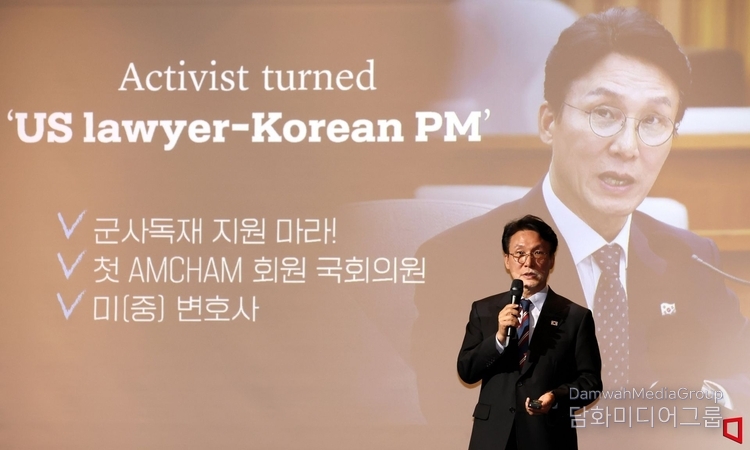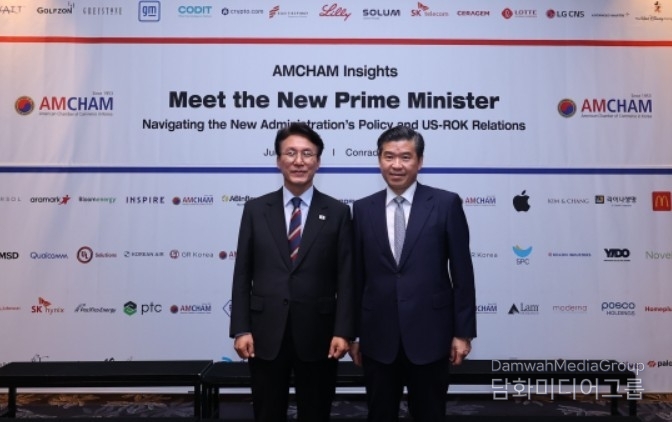By Diplomacy Journal Lee Kap-soo
The American Chamber of Commerce in Korea hosted an AMCHAM Insightsevent on July 22, featuring South Korean Prime Minister Kim Min-seok at the Conrad Seoul.
Examining the theme “Navigating the New Administration: Business Roles in a Changing Policy Landscape,” the event brought together approximately 140 participants, including key figures from government, industry, and academia.

Attendees engaged in in-depth discussions on the policy direction of the Lee Jae-myung administration and the potential impact of U.S.-Korea economic cooperation on the business environment. The event was particularly timely and meaningful as it marked Prime Minister Kim Min-seok’s first official engagement with AMCHAM since taking office earlier this month.
In his opening remarks, AMCHAM Chairman and CEO James Kim said, “As we navigate ongoing tariff negotiations between our two nations, AMCHAM sees tremendous opportunities to deepen bilateral economic cooperation and advance our shared goals. From shipbuilding and aerospace to energy and technology, AMCHAM member companies are leading the way in building high-impact partnerships.”
He continued, “At the same time, addressing Korea-unique regulations remains critical to creating a more balanced and sustainable trade environment. Through initiatives like our ‘Buy America’ campaign, AMCHAM is proud to support greater visibility and accessibility of U.S. products in Korea. As a trusted bridge, AMCHAM remains fully committed to working with both governments to ensure that the U.S.-Korea alliance continues to thrive in this new era.”
Charge d’Affaires Joseph Yun from the U.S. Embassy Seoul, echoed the importance of continued U.S.-Korea collaboration in his congratulatory remarks.
Delivering a keynote address, Prime Minister Kim Min-seok stated, “The new administration is designing economic policy rooted in democracy, inclusiveness, and innovation. Our goal is to enhance global competitiveness through a pragmatic approach, focused on nurturing strategic industries such as AI, Bio, Contents and Culture, Defense, and Energy (the so-called ABCDE industries), expanding foreign investment, regulatory reform, and strengthening international economic cooperation. These efforts will be realized through collaborative partnerships with global companies, with our strategic partnership with the United States forming the central pillar.”

He added, “Korea-U.S. relations now stand on a new foundation beyond the frameworks of the past. The two nations share universal values rooted in constitutional democracy and have, over the decades, developed into a true value-based alliance through deep people-to-people ties, cultural affinity, and cooperation across strategic industries. Amid the rapid shifts in the global order and the restructuring of global supply chains, this is a moment that calls for a 'Zero Point Shift.' It is time for both countries to grow stronger together and design a greater future based on fresh perspectives and imagination. We can now go beyond ‘Make America Great Again,’ and move toward ‘Make Korea and the World Greater.’”
The event also featured a panel discussion on “The New Administration’s Policy Direction and the Future of Korea-U.S. Economic Cooperation,” moderated by Chankyeong Choi, Associate Director at GR Korea. Panelists included National Assemblyman Kim Han-kyu of the Democratic Party of Korea, Commissioner Tae Hyung Kimof Invest Korea, Deputy Director for Politics and Foreign Affairs Ji Young Seo of KBS, and Professor of Political Science and Director of the Institute of Unification Wang Hwi Lee of Ajou University.
The panel addressed a broad range of issues, including the defining characteristics and strategic direction of the Lee Jae-myung administration’s economic policy; promising sectors for foreign investment; the government's approach to navigating challenges such as tariff negotiations and U.S.-China competition; evolving dynamics between the government and the National Assembly from a parliamentary perspective and their implications for policy momentum; and the media’s interpretation of the administration’s evolving economic strategy.
Juyun, Moon, Head of Operations & Executive Director at GR Korea, said, “At a critical time when both the global and Korean business communities are closely watching the new Lee Jae-myung administration’s policies, this was a timely seminar that offered valuable insight into the administration’s commitment to pro-business policies that embrace global companies as well as its continued recognition of the United States as a key strategic partner.”
The seminar reaffirmed AMCHAM’s commitment to fostering dialogue on strategic issues that impact both Korean and global business communities as a key platform for strategic dialogue. With South Korea under a new administration and ongoing U.S.-Korea tariff discussions, this event offered critical insight into adapting business strategies amid evolving policy dynamics.
